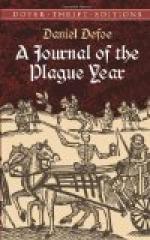The second trade was that of coals from Newcastle-upon-Tyne, without which the city would have been greatly distressed; for not in the streets only, but in private houses and families, great quantities of coal were then burnt, even all the summer long, and when the weather was hottest, which was done by the advice of the physicians. Some, indeed, opposed it, and insisted that to keep the houses and rooms hot was a means to propagate the distemper, which was a fermentation and heat already in the blood; that it was known to spread and increase in hot weather, and abate in cold; and therefore they alleged that all contagious distempers are the worst for heat, because the contagion was nourished, and gained strength, in hot weather, and was, as it were, propagated in heat.
Others said they granted that heat in the climate might propagate infection, as sultry hot weather fills the air with vermin, and nourishes innumerable numbers and kinds of venomous creatures, which breed in our food, in the plants, and even in our bodies, by the very stench of which infection may be propagated; also that heat in the air, or heat of weather, as we ordinarily call it, makes bodies relax and faint, exhausts the spirits, opens the pores, and makes us more apt to receive infection or any evil influence, be it from noxious, pestilential vapors, or any other thing in the air; but that the heat of fire, and especially of coal fires, kept in our houses or near us, had quite a different operation, the heat being not of the same kind, but quick and fierce, tending not to nourish, but to consume and dissipate, all those noxious fumes which the other kind of heat rather exhaled, and stagnated than separated, and burnt up. Besides, it was alleged that the sulphureous and nitrous particles that are often found to be in the coal, with that bituminous substance which burns, are all assisting to clear and purge the air, and render it wholesome and safe to breathe in, after the noxious particles (as above) are dispersed and burnt up.
The latter opinion prevailed at that time, and, as I must confess, I think with good reason; and the experience of the citizens confirmed it, many houses which had constant fires kept in the rooms having never been infected at all; and I must join my experience to it, for I found the keeping of good fires kept our rooms sweet and wholesome, and I do verily believe made our whole family so, more than would otherwise have been.
But I return to the coals as a trade. It was with no little difficulty that this trade was kept open, and particularly because, as we were in an open war with the Dutch at that time, the Dutch capers[301] at first took a great many of our collier ships, which made the rest cautious, and made them to stay to come in fleets together. But after some time the capers were either afraid to take them, or their masters, the States, were afraid they should, and forbade them, lest the plague should be among them, which made them fare the better.




